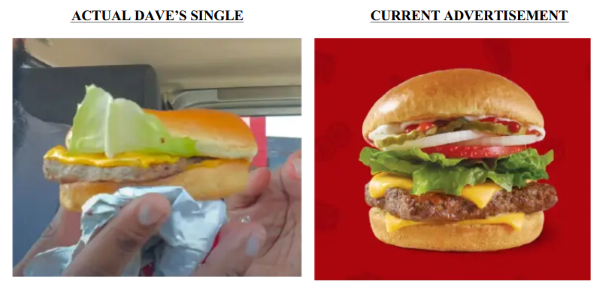Weekly Briefs: McDonald’s, Wendy’s sued over burger ads; ICE is 'a domestic surveillance agency,' report says

Images from the lawsuit.
Ads exaggerate size of McDonald’s, Wendy’s burgers, suit says
Food stylists for McDonald’s and Wendy’s undercook hamburger patties portrayed in advertising to make them appear 15% to 20% larger than the food sold by the fast-food restaurants, a May 17 lawsuit alleges. The would-be class action suit, filed in Brooklyn, New York City, federal court, alleges violations of state consumer protection laws, breach of contract, negligent misrepresentation and unjust enrichment. (Reuters, the Washington Post, the lawsuit)
ICE has built a massive surveillance system, report says
U.S. Immigration and Customs Enforcement has created a “surveillance infrastructure” that has the ability to “pull detailed dossiers on nearly anyone,” according to a report by the Georgetown University Law Center’s Center on Privacy and Technology. ICE built the database to carry out deportations. The agency has accumulated driver records, utility customer information, child welfare records, call records, employment records, housing records and social media posts. “ICE now operates as a domestic surveillance agency,” according to the report. (Engadget, the report)
Judge blocks Alabama ban on transgender-transition meds for youths
U.S. District Judge Liles Burke of the Northern District of Alabama has temporarily blocked provisions in an Alabama law that prevented doctors from prescribing medications, such as hormones and puberty blockers, to help transgender minors transition. Burke’s May 13 decision, however, allowed enforcement of another provision in the law that bans sex-altering surgeries for minors. The U.S. Department of Justice has joined a challenge to the law, arguing that it violates the equal protection clause because it discriminates against transgender youths. (The New York Times, CNN, the Associated Press)
Perkins Coie was paid $75K per month by Clinton campaign
A prosecutor in the trial of a former Perkins Coie partner presented information Wednesday about the the amount of money that the law firm was being paid by the Clinton campaign. Assistant special counsel Andrew DeFilippis said the law firm at first received a monthly fee of $130,000 in spring 2015. In most of 2016, the firm received $75,000 per month. The former partner on trial is Michael Sussman. He is accused of lying to the FBI about his reasons for bringing the agency information in September 2016 about an alleged secret communications channel between the Trump Organization and a Russian bank. Sussman is accused of saying he wasn’t forwarding the information on behalf of any client, even though he went to the FBI partly for the Clinton campaign. The FBI later determined that there was insufficient evidence to support the secret-channel allegation. Sussman’s lawyers argue that he revealed the information to the FBI because of his national security concerns. (Law.com, Law360)



